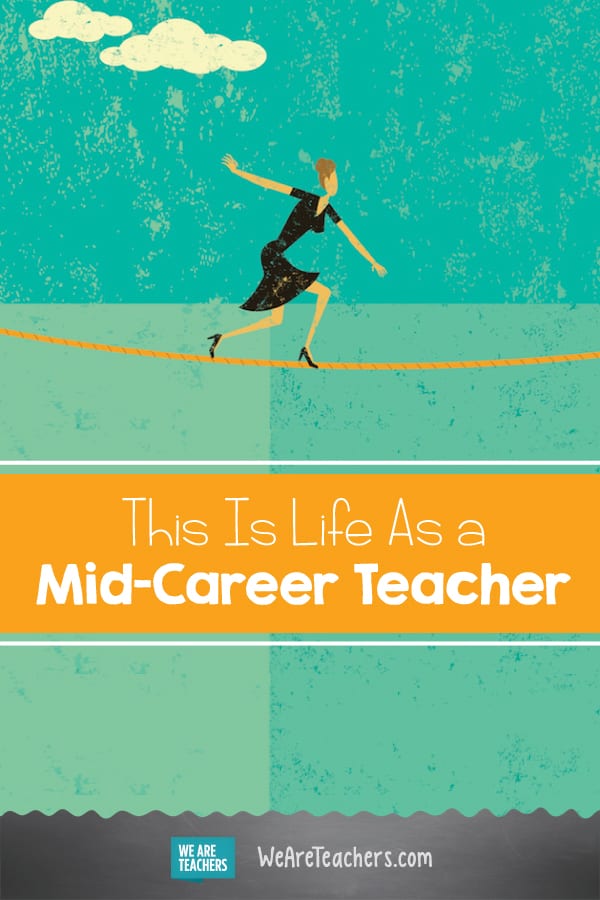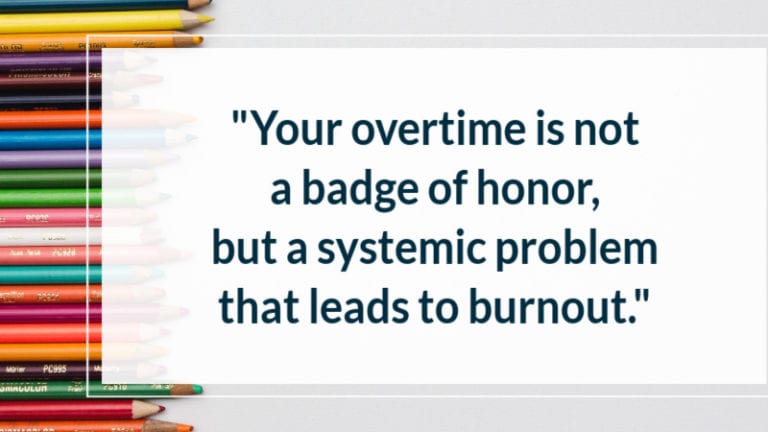Dear mid-career teacher,
You made it! Against all odds, you’ve survived over a decade in the classroom, persevering through the annual first-week soreness, the virulent waves of pinkeye, stomach bugs, and head lice, and probably no fewer than twenty-six computer based grading systems. Congratulations! And even better, that jerk who told you, “Only 29 years and 179 days to go until retirement,” on your first day has probably long since left the profession!
Once you’re past your first ten or twelve years, I think you can safely call yourself a lifer. If the kids, the parents, or the administration haven’t run you out of the profession, chances are you’re exactly where you were meant to be. And while it has its challenges, being a mid-career teacher can be pretty wonderful.
You have more responsibilities outside of school …
If, like me, you started teaching right after college, you were probably pretty footloose and fancy free. You could go out and have fun on weekends…or fall asleep on the couch at 8:30 after a long day of lesson planning. Now, things are different. Maybe you’ve got kids, or a house in need of constant repair, or particularly demanding pets, or your parents are getting older and relying on you a little more. The stress of school is now part of a longer list of factors keeping you from a good night’s rest on the sofa with a red pen still dangling from your exhausted fingers.
[contextly_auto_sidebar]
… But you also have a little more perspective.
It’s like I tell my middle schoolers every year: The stress doesn’t decrease, but you get better at managing it. In those early years, everything seemed so dire. If the essays didn’t get graded or the bulletin board wasn’t perfect, could you even call yourself a teacher? Now, in addition to having some hacks that make life a lot easier (group projects, anybody?) you’ve got a clearer sense of how to prioritize and which tasks really make a difference for your students. And, hopefully, you’ve learned how to cut yourself a little more slack.
You don’t have the energy you had when you started …
Remember that bright-eyed first year teacher? You were going to redesign the curriculum and make a personal connection with every student and coach the soccer team and direct the play and also repaint all the stall doors in the girls’ bathroom as a class project! Then it turned out that you needed every bit of that drive and motivation and enthusiasm just to get through a regular day of teaching.
… But you have the experience to make up for it.
You don’t have to spend thirty minutes searching for a good work sample for an IEP meeting anymore; now you can pull it straight out of your giant teacher bag like Mary Freakin’ Poppins. Lesson plans aren’t nearly as daunting when you’ve already done thousands of them, and even if one is a flop, you probably have a good backup activity that doesn’t require any planning or materials.
New technology is gradually becoming more intimidating …
If you’re in the middle of your career, there’s a good chance you started teaching with an overhead projector. Smartboards are magical, but a little scary, and it’s possible that the most recent attendance-taking platform made you cry at some point. Why can’t they just keep it the same? And why won’t those kids get off your lawn?
… But you’re a pro at learning new skills.
If you’ve been teaching this long, chances are you’re a lifelong learner. In your years in the classroom, you’ve gotten better at assessing what your students need you to know – whether it’s how to use iMovie or how to speak Spanish – and finding the resources to learn it. If you’re lucky, you’ve even gotten to share this growth with your kids and show them how an expert approaches metacognition.
You’ve gotten a little jaded …
If you started teaching fifteen years ago, you came in as No Child Left Behind was taking over our classrooms and standardized testing began to rule our lives. Maybe your college professors told you that the pendulum would swing back toward authentic education, and it took you a while to discover that they were wrong. You’ve learned that, no matter what all the inspirational teacher movies told you, saving the world is probably not something you’ll accomplish this year, because you’re too busy demonstrating how data shapes your instruction so you’ll survive your next mid-year evaluation conference.
… But you know how bright the future looks.
Maybe the system itself has become more restrictive, but the kids have only gotten more amazing. If you’ve made it this far, you’re not buying into the hype about how teenagers eat laundry detergent and the world is going to hell in a handbasket. You’ve seen generations of students confront racism, sexism, and economic inequality with the passion and idealism of youth. You’ve seen kids overcome insane obstacles to do great things, and you’ve watched them drag the adults in their lives toward new understandings about gender and mental health and what it means to support others. If you spend your days around kids, it’s impossible not to be hopeful about the future.
Yeah, the middle of a teaching career isn’t a bad place to be. You’ve had your life touched and transformed by hundreds of kids, although maybe you’ve forgotten a few of their names by this point. Only fifteen years and 164 days until retirement…and that’s totally okay.
How would you characterize life as a mid-career teacher? Come and share in our WeAreTeachers Chat group on Facebook.
Plus, why being a mom made be a better teacher.


